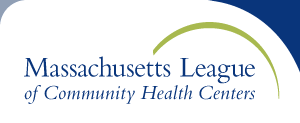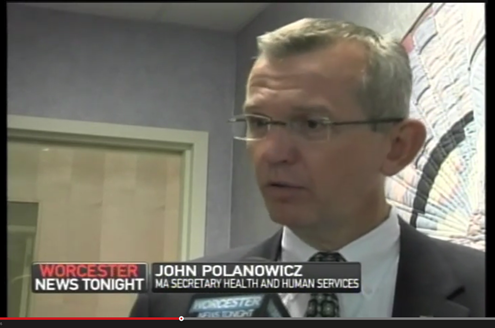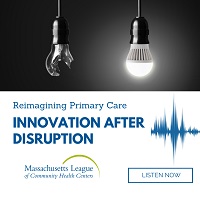8-11-14 Feature Story:
Codman Square, Dorchester, MA -- In recognition of the critical role health centers play in ensuring access to a full range of high quality primary and preventive health care for more than 875,000 Massachusetts residents, Executive Office of Health and Human and Services Secretary John Polanowicz on Monday, August 11 issued a Proclamation from Governor Patrick at Codman Square Health Center in Dorchester to mark National Health Center Week (NHCW) in Massachusetts. NHCW is an annual celebration which highlights the work of health centers in the more than 7,000 communities they serve nationwide.
"Community Health Centers are a vital piece of our nation-leading health care system," said HHS Secretary Polanowicz. "The Patrick Administration has worked in partnership with Community Health Centers across the state to tackle chronic health issues, strengthen care coordination and increased efficiencies in health care."
Secretary Polanowicz is celebrating Community Health Center Week with visits to 6 additional health centers between August 11 and 15. They include: Upham's Corner Health Center in Dorchester, Fenway Community Health Center, South Cove Community Health Center in Chinatown, Whittier Street Health Center in Roxbury, Edward M. Kennedy Community Health Center in Worcester, and SSTAR Family Health Care Center in Fall River.
In Massachusetts, 49 Community Health Centers provide care to one out of eight state residents through more than 285 sites, offering medical, dental, eye, mental health and pharmacy services, as well as a host of preventive care initiatives, including nutrition counseling, local farmers' markets, fitness programs and help with managing chronic illnesses such as diabetes and hypertension.
In addition to employing nearly 12,000 individuals, health centers also provide critical entry level jobs and career building opportunities right in the communities they serve. As drivers of local economies, health centers often are the largest neighborhood employer, act as local purchasers of goods and services, and generate and stimulate secondary businesses such as restaurants, pharmacies, and retail stores.
In 2012, Massachusetts health centers produced a total economic impact exceeding $2 billion, generating $1.77 billion in total health center expenditures and payroll, stimulating $1.67 billion in earnings for other local businesses, employing 11,967 state residents, and supporting 6,055 additional jobs at businesses located within their communities.
All community health centers undergo rigorous on-site accreditation visits and regularly exceed national quality and performance standards. Health centers perform equal to or better than private practice physicians on 94% of national health care quality measures. In Massachusetts, federally-funded health centers continuously rank above the national average on health measures related to helping patients quit smoking and manage hypertension and diabetes; preventing low birthweight babies; providing childhood immunizations; and screening for colorectal and cervical cancer.
Community health centers have long operated within a patient-centered care model, employing comprehensive care teams that include physicians, nurse practitioners, health educators, behavioral health counselors, language interpreters and community health workers who proactively plan care with patients. Because of their unique model, care received at health centers is ranked among the most cost-effective across all settings.
For example, total patient care costs at health centers are 24-50% lower when compared with patients served in other settings. Health center patients have 18% lower rates of emergency room visits and 64% lower rates of multi-day hospital admissions. By actively coordinating and managing care, health centers save in excess of $1,200 per patient annually in total health care costs. This amounts to more than $24 billion in system-wide savings.
In Massachusetts, health centers care for nearly 30 percent of the Commonwealth's Medicaid patients at a cost of only 1.3 percent of total annual state Medicaid spending. League CEO and President James W. Hunt, Jr. says those savings are stunning when you begin to consider the vulnerable individuals health centers serve: " Health centers produce these savings -- and by extension better health outcomes -- despite the fact that their patients often suffer from more than one chronic illness, remain at higher risk for developing dental problems and mental health issues, and struggle with job insecurity and access to healthy food," said Hunt.
Nearly 50 years ago, the first health center in the nation was founded at Columbia Point, Dorchester, by physician-activists H. Jack Geiger and Count Gibson. Just two years later, a young Senator Edward M. Kennedy helped to expand the model across the country, creating a federal program that now serves more than 22 million people.
"As the nation seeks answers for improving the quality and efficiency of health care, the health center model continues to prove that a coordinated and comprehensive approach to care delivery is a solution," said Hunt.













